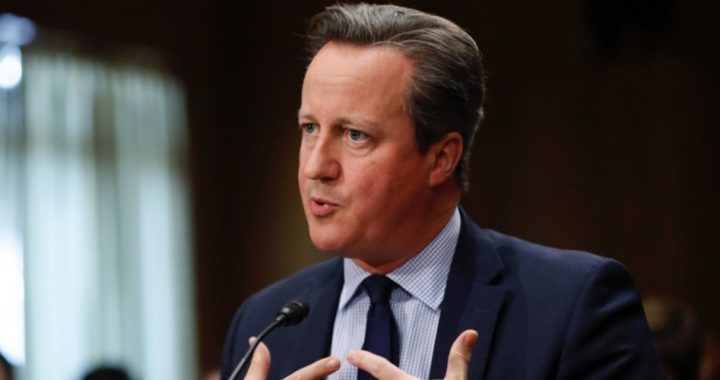
Podcast: Play in new window | Download ()
Subscribe: Android | RSS | More
As if Great Britain and new Prime Minister Boris Johnson weren’t having enough problems, along comes the memoir of former prime minister David Cameron, For the Record, set to be released this Thursday by HarperCollins. The long-anticipated tome is said to contain many of Cameron’s most intimate thoughts as he led the U.K. into the 2016 Brexit referendum.
Cameron, who was prime minister from 2010 until 2016, is widely blamed or credited — depending on one’s point of view — for allowing the Brexit referendum to move forward owing to pressure within his own Conservative Party. In the book, Cameron writes that he is “truly sorry” for all of the insecurity and confusion that the referendum has caused the country.
“I did not fully anticipate the strength of feeling that would be unleashed both during the referendum and afterwards, and I am truly sorry to see the country I love so much suffer uncertainty and division in the years since then,” Cameron writes.
An ardent “remainer,” Cameron claims that current PM Johnson initially did not believe in the U.K. leaving the European Union, but became a prominent “leave” supporter “because it would help his political career.”
In looking back at the events of 2016, Cameron seems to claim that “Leave” was a much easier sell than “Remain,” since it promised change instead of the status quo, and that Johnson was simply quicker to see this than other Tory politicians.
“Whichever senior Tory politician took the lead on the Brexit side — so loaded with images of patriotism, independence and romance — would become the darling of the party,” Cameron wrote. “[Johnson] did not want to risk allowing someone else with a high profile — Michael Gove in particular — to win that crown.”
“The conclusion I’m left with is that [Johnson] risked an outcome he didn’t believe in because it would help his political career,” Cameron wrote.
Gove, the current chancellor of the Duchy of Lancaster, and Cameron were once close friends, but that friendship was torn apart by being on opposite sides of Brexit. Cameron accused both Johnson and Gove of behaving “appallingly” during the referendum, particularly in claiming that EU membership cost Great Britain £350 million per week, and that Turkey would soon join the superstate. Cameron claimed that the two “left the truth at home” by making that claim.
After the result of the 2016 referendum, Cameron claimed to have called then-U.S. President Barack Obama and the 27 European heads of state to apologize. Cameron immediately resigned after the referendum, which led to the completely ineffective Theresa May becoming prime minister.
After leaving office in 2016, Cameron has had very little to say on the subject of Brexit or British politics in general.
Johnson, who is in Luxembourg today to meet with EU Commission president Jean-Claude Juncker about the possibility of negotiating a new Brexit deal, dismissed any rift between himself and Cameron, saying that “absolutely nothing” Cameron might say “will diminish the affection and respect in which I hold him.”
At an event in Rotherham, Johnson said of Cameron, “He has a very distinguished record and a legacy to be proud of.”
But if Cameron has similar feelings for Johnson, he’s hiding them well. The former prime minister also took the current prime minister to task for actions he has taken since taking up residence at Number 10 Downing St. in July, calling Johnson’s decision to prorogue parliament and his exile of 21 turncoat Tory MP’s “sharp practices.”
Cameron made the remark in an interview with The Times published Sunday.
“Of course, as a new prime minister I wished Boris well. I wanted him to get a deal from the EU that would have passed the House of Commons. If that was to happen, I would have been elated,” Cameron said.
“But clearly while he started down that road, the strategy has morphed into something quite different.”
“Taking the whip from hard-working Conservative MPs and sharp practices using prorogation of Parliament have rebounded. I didn’t support either of those things,” Cameron concluded.
One thing Cameron doesn’t rule out is a “re-do” of the original Brexit referendum. “I don’t think you can rule it out because we’re stuck,” Cameron said. “I’m not saying [a new referendum] will happen or should happen. I’m just saying you can’t rule things out right now because you’ve got to find some way of unblocking the blockage.”
The last statement defines Cameron and his time as prime minister succinctly. He was then and remains wishy-washy — unable to decide on a course of action. The British people spoke very clearly in 2016. They wished to leave the European Union. More than three years from that vote, the nation remains entangled in that sticky web.
And politicians such as Cameron are the reason why.
Photo: AP Images




